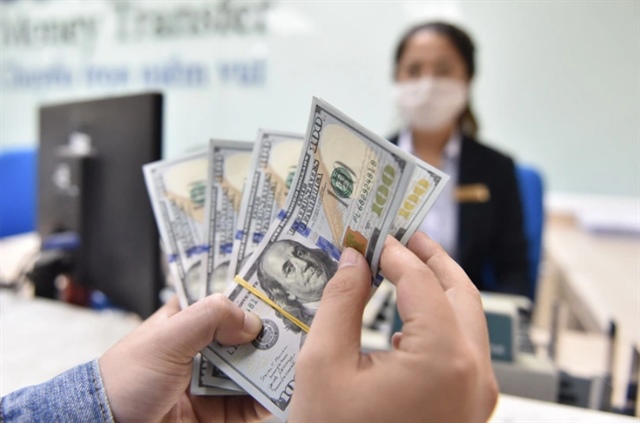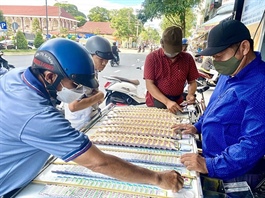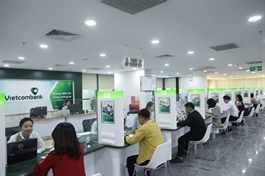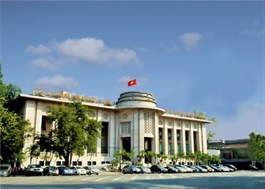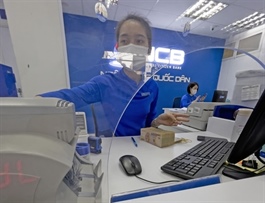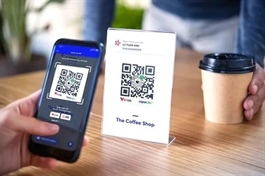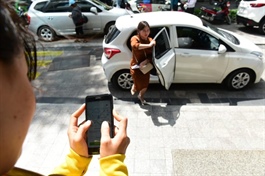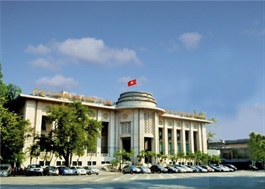How does Vietnam manage foreign currencies?
How does Vietnam manage foreign currencies?
Many believe that the Vietnamese government should tighten its management of foreign currencies following the recent uncovering of bribes worth millions of U.S. dollars in a slew of major criminal cases.
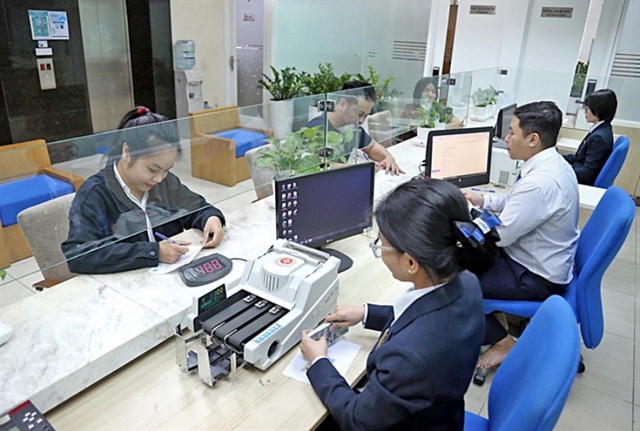
A teller counts U.S. banknotes at a bank in Ho Chi Minh City. Photo: Quang Dinh / Tuoi Tre |
As a case in point, former Minister of Health Nguyen Thanh Long was sentenced on Friday last week to 18 years in prison for taking bribes worth US$2.25 million, while Chu Ngoc Anh, former science and technology minister, was jailed for three years for mismanagement, the security ministry said in a statement.
Vietnam issued its Ordinance on Foreign Exchange in 2005 when its economy was experiencing gold and greenback price fluctuations.
This fiat allowed residents to keep foreign currencies and give foreign currencies to others.
The ordinance further prohibits residents from engaging in unregulated foreign currency trading, limiting the sale of foreign currencies to licensed banks exclusively.
The rationale behind this restriction is that while foreign currencies are considered personal belongings, they are also regarded as a national resource.
Selling these currencies only to banks is seen as a means to contribute to the country's development, particularly in terms of the import sector and bolstering foreign exchange reserves.
Residents caught selling foreign currencies to gold shops, for example, are in violation of the ordinance and could be levied a fine.
In 2018, Vietnam imposed a fine of VND90 million ($3,675) on a man from the Mekong Delta city of Can Tho for exchanging a 100-U.S.-dollar bill for VND2.26 million at a local gold shop that was not licensed to provide currency exchange services.
The gold shop owner was subject to a heftier fine of VND180 million ($7,349) for “conducting currency exchange service without license.”
Local police also confiscated the greenback and VND2.26 million in cash.
Such situations, however, are rare, and many locals typically visit gold shops to exchange U.S. dollars for Vietnamese dong due to convenience factors, such as easier parking and shorter wait times.
Transactions done at gold shops also typically come with better exchange rates and without paper trails.
|
|
| Customers transact remittances at DongA Money Transfer Co. Ltd. in District 3, Ho Chi Minh City, January 8, 2024. Photo: Phuong Quyen / Tuoi Tre |
While the gold shop system definitely has its inherent conveniences, it also makes it relatively simple for individuals to mobilizes hundreds of thousands, or even millions, of U.S. dollars in cash.
U.S. dollars in Vietnam tend to come from a variety of sources, including local savings or smuggling via selling gold to other countries, foreigners, or remittances.
Despite the tight management of foreign currencies, banks in Vietnam also pump greenbacks into the economy by allowing the withdrawal of remittances.
There is apprehension regarding banks allowing residents to withdraw foreign currencies, as some are concerned that if banks discontinue this service, residents might resort to using illicit channels that are more challenging to regulate.
Currently, Vietnam facilitates remittance transfers and withdrawals, even offering incentives, such as a 10-percent exemption on the personal income tax for remittance recipients.
Customers can open bank accounts in foreign or Vietnamese currencies, according to Nguyen Hoang Minh, former deputy director of the State Bank of Vietnam’s Ho Chi Minh City Branch.
They, for instance, have the option to receive a remittance of $100 in either U.S. dollars or Vietnamese dong, based on the prevailing exchange rate at the time of withdrawal.
Alternatively, they can deposit the amount in U.S. dollars, though it is important to note that the current interest rate on such deposits is zero percent.
As Vietnam has managed to keep its exchange rate under control in recent times, many remittance recipients have decided to exchange foreign currencies for the Vietnamese dong.
Residents can sell foreign currencies, including those obtained through smuggling and bribery, even to gold shops.
But a significant portion of foreign currencies acquired by gold shops eventually finds its way back to banks.
Giving local residents the right to keep foreign currencies also helps stabilize the macro-economy.
At present, Vietnamese people are depositing tens of billions of U.S. dollars in banks.
If they want to withdraw those deposits, they can receive them in U.S. dollars.
If the government forces them to receive cash in Vietnamese dong, it would cause fluctuations in savings and exchange rates.
|
|
| A customer holds stacks of U.S. banknotes at a bank in Ho Chi Minh City. Photo: Ngoc Phuong / Tuoi Tre |
There is also a rule that residents must make payments in Vietnamese dong while in Vietnam.
With these regulations in mind, the forex market has operated smoothly without sharp exchange rate fluctuations over the past two decades.
Banks are unable to attract cash in foreign currencies through administrative measures alone.
Instead, they rely on economic solutions, employing monetary, exchange rate, and interest rate policies to encourage amicable deals and transactions.
These policies should show residents that they will get fewer benefits when keeping U.S dollars and they will sell greenbacks to banks.
In reality, many people tended to exchange remittances in U.S. dollars for cash in Vietnamese dong at banks several years ago, as they found that keeping the greenback brought no benefit.


